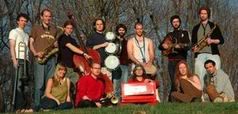Adil Najam
 I am not sure how ATP readers will react to this, but let me say that I have been totally mesmerized by this music and have had it on auto-repeat play for the last three days.
I am not sure how ATP readers will react to this, but let me say that I have been totally mesmerized by this music and have had it on auto-repeat play for the last three days.
But, first let me thank Zeeshan Suhail, on whose blog I found this wonderful fusion/jazz band called Brook’s Qawwali Party (BQP).
BQP produces a captivating sound based on Nusrat Fateh Ali Khan’s classic works and turn it into a unique and peculiar fusion of sufi qawalli rhythyms and jazz. But I will let them explain what they and their music is about. According to the BQP webpage (since unavailable):
What would happen if New York jazz musicians were to play and improvise around the melodies of Nusrat Fateh Ali Khan? From this idea, Brook’s Qawwali Party was born. BQP consists of fourteen musicians: five horns, three percussionists, guitar, acoustic bass, harmonium and three designated clappers. The exuberant sound of BQP has been enthusiastically welcomed in New York City and across the globe.
According to Sepia Mutiny “Brook’s Qawwali Party is … made up of non-desi Brooklynites who get together in Park Slope… [they are] probably one of the only Sufi bands with Jewish members in existence.”
Of the half dozen audio clips that I have heard, my favorite is ‘Beh Haadh Ramza Dhasdha’ (He Manifests Himself in Many Forms)
I am a big fan of the original by Nusrat Fateh Ali Khan (in the album Shahbaaz) — I believe it is a tribute to Mansoor Hallaj shouting Ana al Haqq, even as he is executed on the gallows.
The BQP version has a very different quality to it and in the beginning I could not pin it down. But as I hear it again and again it seems to me that because they are using horns, their version has a shaadi waala band sound to it (I say this as a compliment because I am a huge fan of shaadi waala brass bands).
Anyhow, do listen and make up your own mind.
Of the other clips on their site, I also like Tou Kareemi very much. It again has that interplay of horns that reminds me of a good military band playing at a shaadi. Both of these are rather ‘fast’ numbers. If you are looking for mellower sounds you should try their rendition of Man Kuntou Moula. Their versions of Mast Mast and Allah Hou, Allah Hou are not bad but these seemed much more like instrumental versions of Nusrat Fateh Ali Khan’s originals and, especially in the later, the chant of ‘Allah Hou’ gets a little too Americanized in accent for my taste.
(UPDATE: The clips I had first written about are no longer available. Here are some newer YouTube renditions:



















































yes ur the best fan of by Nusrat Fateh Ali Khan i m allso
Folks,
Good news! BQP has a CD out with some four amazing songs. More info here: http://cdbaby.com/cd/brooklynqawwali
Enjoy, and spread the word!
Zeeshan
Hello,
Those of you who like music by Brooklyn Qawwali Party may also be interested in the collaboration between Rizwan-Muazzam Qawwal (nephews of Nusrat Fateh Ali) and Temple of Sound, a CD entitled People’s Colony No. 1.
You may also like the music of Shabaaz. They have released CDs under the name Ali Khan Band as well.
Ahmed
Just stumbled on this for the first time. Beautiful music. Love all the clips included here, but specially the first one based on Beh Haadh Ramza.
Firstly, many heartfelt thanks for your original post and the collection of thoughtful responses. We are honored to be at the center of such critical yet loving discourse. Brooklyn Qawwali Party (yes, our founder Brook Martinez is on hiatus from the band, but the ensemble and repertoire remains constant) is concerned primarily with expressing the beauty and power of Nusrat’s music. While we have made obvious concessions texturally (horns replace vocalists, percussion and drumset replace dhol–or in NFAK’s case, the flour-pasted tabla, added electric guitar and acoustic bass), the group makes a concerted effort to speak the language of Qawwali which is similar to jazz in it’s improvisitory elements, but fundamentally different in form. Traditionally, across a variety of jazz styles, the emphasis is placed upon the soloist, and between main melodies individuals seek out places to enter, develop, and conclude completed improvisitory statements. As members of BQP, we strive to pay tribute to the main melodies foremost, and approach solos more like the spirited interjections of gospel singers (in fact, many of us describe the band to new audience members as a type of “Pakistani gospel-musicâ€